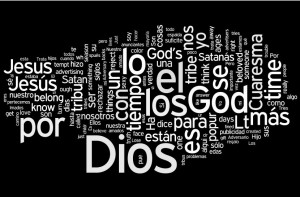Matthew 4:1-11: A bilingual sermon for the First Sunday in Lent
Whenever I read of Jesus’ temptation in the desert, of Ha Satan, the Adversary, tempting Jesus with food, with great spectacle, with power, daring Jesus to become someone he is not,[1] I think of TV commercials.
Siempre que leo de la tentación de Jesús en el desierto, de Ha Satanás, el Adversario, tentando a Jesús con los alimentos, con gran espectáculo, con el poder, atreverse Jesús a convertirse en alguien que no es – pienso en comerciales de televisión.
I’ve never liked most ads on TV. The ones that are trying to sell me something? They drive me nuts.
Nunca me ha gustado la mayoría de los anuncios en la televisión. Los que están tratando de venderme algo? Me vuelven lo.
“What?” I think to myself, “do these people think I’m stupid? Do they really think I’m going to fall for their tricks?”
“¿Qué?” Creo que a mí mismo “¿Estas personas piensan que soy estúpido? ¿Realmente crees que voy a caer en sus trampas?”
You know the commercials I’m talking about, right? The ones assuring me that if I buy their products, I’ll be richer, more popular, thinner, sexier, “in”?
Ustedes saben los anuncios que estoy hablando, ¿verdad? Los asegurándome que si puedo comprar sus productos, voy a ser más rico, más popular, más delgada, más sexy, “en”?
So I reject their advances. I turn off the sound. I refuse to be drawn in by an advertisement that promises more than it can deliver, that tries to divert me from the fact that not only do I not need that which they are selling, not only do I not want that which they are offering, I do not believe them.
Por lo tanto, rechazar sus avances. Puedo desactivar el sonido. Me niego a ser atraídos por un anuncio que promete más de lo que puede dar, que intenta distraerme del hecho de que no sólo no hace falta que los que están vendiendo, no sólo que no quiero que los que están ofreciendo, yo no les creo.
Because I know that most advertisers are not telling the truth. They are bending the truth, trying to make me believe that if I buy what they’re offering, I’ll be someone I am not.
Porque yo sé que la mayoría de los anunciantes no dicen la verdad. Se trata de doblar la verdad, tratando de hacerme creer que si yo compro lo que están ofreciendo, voy a ser alguien que yo no soy.
To me, most advertisers rank right up there with Ha Satan, the Adversary who tried to dare Jesus to be someone he is not.
Para mí, la mayoría de los anunciantes en el mismo escalafón con Ha Satanás, el Adversario que trató de Jesús se atreve a ser alguien que no lo es.
Because I know that driving the fastest, biggest, most expensive car in town won’t make me a better person.
Porque yo sé que la conducción más rápida, más grande, más caro coche de la ciudad no me hará una mejor persona.
So what if my hair has turned grey? I don’t need to color it to be me.
¿Y qué si mi pelo se ha vuelto gris? Yo no necesito el color a ser yo.
And frankly, I like the laugh lines around my eyes and mouth – they say something important about me.
Y francamente, me gusta la líneas de expresión alrededor de los ojos y la boca – se dice algo importante acerca de mí.
I do not believe the advertisers because I know who I am – I am Lauren, a beloved child of God.
More importantly, I know whose I am – I belong to God.
No creo que los anunciantes porque yo sé quién soy – Soy Lauren, una hija amada de Dios.
Más importante aún, yo sé cuya soy – Yo pertenezco a Dios.
So my answer to all those Tempters out there?
Away with you, Satan!
Así que mi respuesta a todos los tentadores por ahí?
Vete, Satanás!
Jesus didn’t have to face television advertising in the days when he walked the earth. But he did have to face Ha Satan, the Adversary who tried to tempt him into becoming someone he was not.
Jesús no tenía para hacer frente a la publicidad televisiva en los días en que estuvo en la tierra. Pero sí tienen que hacer frente Ha Satanás, el Adversario que trató de tentarlo para convertirse en alguien que no lo era.
Immediately following his baptism in the River Jordan, immediately after hearing God confirm who he was (the Son of God) and whose he was (God’s beloved, in whom God was well-pleased),[2] Jesus went out into the desert. That’s what people did in those days, when they wanted to get closer to God. They turned heir backs on the hurly-burly of their lives and spent some time alone, doing their best to come face to face with God.
Inmediatamente después de su bautismo en el río Jordán, inmediatamente después de escuchar a Dios confirmar quién era él (el Hijo de Dios) y que cuya (de Dios amado, en quien Dios estaba muy complacido), Jesús se fue al desierto. Eso es lo que hizo en aquellos días, cuando quiso acercarse a Dios. Se volvieron la espalda heredero en el bullicio de su vida y pasó algún tiempo a solas, haciendo todo lo posible para encontrarse cara a cara con Dios.
After 40 days and 40 nights all alone with God, when Jesus was at his weakest, the Tempter, Ha Satan, showed up.
Después de 40 días y 40 noches a solas con Dios, cuando Jesús estaba en su más débil, el Tentador, Ha Satanás, se presentó.
And what did he do?
He didn’t just tempt Jesus.
He called Jesus’ very identity into question!
¿Y qué hizo?
Lo hizo no sólo tentar a Jesús.
Llamó identidad de Jesús en tela de juicio!
If you are the Son of God[3] … turn stones into bread, so that you may eat.
If you are the Son of God[4] … throw yourself down and let the angels catch you.
If you will fall down and worship me[5] … I will give you power and dominion over the whole world.
Si eres el Hijo de Dios … las piedras se convierten en pan, de modo que usted puede comer.
Si eres el Hijo de Dios … lanzarte hacia abajo y dejar que los ángeles te atrapen.
Si se va a caer y me adoras … yo te daré poder y dominio sobre todo el mundo.
Silly Satan.
Satanás loco.
Did he really think he could get Jesus to give up his very being, just for a little bread, a little thrill ride, a little power?
¿Realmente cree que podría conseguir a Jesús a renunciar a su propio ser, sólo por un poco de pan, un paseo de emoción poco, un poco de poder?
Jesus’ answer to the Tempter – Away with you, Satan! – is the original model for the “Just Say No” campaign, the campaign to which all of us are called in this holy season of Lent.
La respuesta de Jesús al Tentador – Vete, Satanás! – es el modelo original de la “simplemente decir que no” de campaña, la campaña a la que todos estamos llamados en este tiempo santo de Cuaresma.
Yes, my friends, it is the season of Lent, the 40 days and 40 nights in which we are called to Just Say No to the things that tempt us away from God. This is the time of year when we as Christians are specifically called to do as Jesus did, to turn our backs on the hurly-burly of our lives so that we can focus – really and truly focus – on who we are and whose we are.
Sí, mis amigos, es la temporada de Cuaresma, los 40 días y 40 noches en la que estamos llamados a decir “no” a las cosas que nos tientan lejos de Dios. Esta es la época del año cuando nosotros como Cristianos están especialmente llamados a hacer como lo hizo Jesús, a su vez en la espalda en el bullicio de nuestras vidas para que podamos centrarnos – real y enfoque realmente – en lo que somos y que nos pertenecen.
Now I know that Lent is not a popular season. It is not, as commentator David Lose says, something we look forward to, like Christmas. (Who asks, he points out, how many days there are until Lent?)[6]
Ahora yo sé que la Cuaresma no es un tiempo popular. No es, como dice el comentarista David Lose, algo que esperamos, como la Navidad. (¿Quién pregunta, señala, ¿cuántos días hay hasta la Cuaresma?)
Indeed, Professor Lose believes that because Lent is not popular, it is in trouble.[7]
De hecho, el profesor cree que perder porque la Cuaresma no es popular, Cuaresma tiene problemas.
It is in trouble, he says, because “it feels like this strange, weirdly anachronistic holiday that celebrates things we don’t value and encourages attitudes we don’t share.”[8]
Tiene problemas, dice, porque “se siente como esta fiesta extraña, extrañamente anacrónico que celebra las cosas que no valoramos y alienta actitudes que no comparto.”
But Lent doesn’t have to be in trouble.
Because Lent is really God’s gift to us.
Pero la Cuaresma no necesita tiene problemas.
Debido a que la Cuaresma es realmente un regalo de Dios para nosotros.
It is a gift because it gives us the time to think again, to know again, that we are beloved children of God, that we belong, from before time began until the ages of ages, to God.
Es un regalo porque nos da tiempo a pensar de nuevo, para saber más, de que somos hijos amados de Dios, que nos pertenecen, desde antes de los siglos hasta que siglos de los siglos, a Dios.
Lent is our time to say “no”… “no” to all the things that get in the way of knowing God’s love, that get in the way of our delighting in God’s will and walking in God’s ways.
La Cuaresma es nuestro tiempo para decir “no” … “no” a todas las cosas que se interponen en el camino de conocer el amor de Dios, que se interponen en el camino de nuestro deleite en la voluntad de Dios y caminar en los caminos de Dios.
Lent is our time to reject that which tries to redefine us, to reject the false advertising of our lives – the advertising from outside us that says, Just do this and you will be … famous, rich, happy, thinner, sexier, “in.”
La Cuaresma es nuestro tiempo para rechazar lo que nos trata de redefinir, de rechazar la falsa publicidad de nuestras vidas – la publicidad de fuera de nosotros que dice: Haz esto y serás … famoso, rico, feliz, más delgado, más sexy, “en.”
It is our time to reject those things that challenge our very identity, that draw us away from identifying ourselves first and foremost with and by God.
Es nuestra hora de rechazar las cosas que desafían nuestra propia identidad, que nos alejan de la identificación de nosotros mismos, ante todo, con y por Dios.
• • •
When I was in Sudan, in an area dominated by one tribe but populated by 15 other tribes, I frequently was asked, because tribal identification is still so very important in that war-torn country, “What tribe do you come from?”
Usually, my questioners wanted me to identify with their tribes, with the Dinka or Nuer, with the Shilluk or the Moro.
Cuando estaba en el Sudán, en una zona dominada por una tribu, pero poblada por 15 tribus otros, con frecuencia se le pidió, porque la identificación tribal es todavía tan importante en ese país devastado por la guerra, “¿De qué tribu vienes?”
Por lo general, mis interrogadores querían que se identifican con sus tribus, con los Dinka o los Nuer, con los Shilluk o los Moro
But I had friends in each of those tribes, and I refused to identify with just one of them.
Pero yo tenía amigos en cada una de esas tribus, y se negó a identificarse con uno de ellos.
It took me a while – a couple of years, actually – but one day, confronted yet again by an aggressive questioner, I heard myself answer:
“I belong to the tribe of God.”
Me tomó un tiempo – un par de años, en realidad – pero un día, se enfrentó una vez más por una pregunta agresiva, me oí responder:
“Yo pertenezco a la tribu de Dios.”
In truth, that tribe – God’s tribe – is the only tribe that counts. And we all belong to it.
En verdad, esa tribu – tribu de Dios – es la única tribu que cuenta. Y que todos pertenecemos a la misma.
The color of our skin? Our country of origin? Who our parents are? The language we speak? The clothes we wear? The jobs we have (or don’t have)? The world may think these things matter, but they do not.
They … do … not … matter.
El color de nuestra piel? Nuestro país de origen? Quiénes son nuestros padres? El idioma que hablamos? La ropa que usamos? Los puestos de trabajo que tienen (o no tienen)? El mundo puede pensar que estas cosas son importantes, pero no lo hacen.
Ellos … no … estan … importa.
The only thing that matters is that we belong to God’s tribe, the tribe of beloved children, created in God’s image, loved from before time until the ages of ages.
Lo único que importa es que pertenecemos a la tribu de Dios, la tribu de los hijos amados, creado a imagen de Dios, amado desde antes de los siglos … hasta que las edades de las edades.
This holy season of Lent?
It is our time to discover anew our membership in that tribe.
Este tiempo santo de Cuaresma?
Es nuestro tiempo para descubrir de nuevo nuestra pertenencia a esa tribu.
We are not defined by what we own.
We are not defined by what we wear … or what we eat … or how powerful we are in this life.
We are defined only by this:
We are God’s beloved children.
And we belong to God.
No están definidas por lo que tenemos.
No se define por lo que usamos … o lo que comemos … o lo poderoso que estamos en esta vida.
Nos están definidas por sólo por esto:
Somos hijos amados de Dios.
Y nosotros pertenecemos a Dios.
If we want to enjoy this gift that is Lent, we will have to be strong. We will have to turn our backs on the temptations that lead us astray from this tribe. We will have to reject the false advertising that says we can be something we are not. We will have to renounce those things that rear up their ugly heads and keep us from seeing God, and seeing ourselves in God.
Si queremos disfrutar de este regalo que es la Cuaresma, vamos a tener que ser fuerte. Tendremos que dar la espalda a las tentaciones que nos llevan por mal camino de esta tribu. Vamos a tener que rechazar la falsa publicidad que dice que puede ser algo que no lo son. Vamos a tener que renunciar a esas cosas que se alzan sus cabezas feas y nos impiden ver a Dios, y vernos a nosotros mismos en Dios.
This is our time. Our time to be with God. Our time to revel in God’s closeness. Our time to open ourselves up – completely and intimately – to the God who created us in love, the one who loves us now, the one who will love us forever.
Este es nuestro tiempo. Nuestro tiempo para estar con Dios. Nuestro tiempo para deleitarse con la cercanía de Dios. Nuestra tiempo de abrirnos – completo e íntimamente – al Dios que nos creó en el amor, el que nos ama ahora, el que nos va a amar para siempre
The next time someone tries to tempt you away from God? Tries to convince you that you are not popular enough, thin enough, sexy enough, “in” enough? Tries to sell you a faster car, a cooler phone? Tries to tell you that you are not eating in the right restaurants or working in the right offices?
Do what Jesus did:
Renounce them! Tell them to go away!
La próxima vez que alguien trata de tentarlo lejos de Dios? Trata de convencerlo de que no son lo suficiente popular, lo suficiente delgada, lo suficiente sexy, lo suficiente “en”? Trata de venderle un coche más rápido, un teléfono más fresco? Trata de decirle que usted no está comiendo en los restaurantes de derecha o de trabajo en las oficinas de derecho?
Hacer lo que hizo Jesús:
Renunciar a ellos! Dile que se vayan!
Because those people? They are not telling the truth. They are Tempters. Adversaries. They stand against God.
Debido a esas personas? Ellos no están diciendo la verdad. Ellos son tentadores. Adversarios. Ellos están en contra de Dios.
Instead, listen to God, who says to you:
You are my beloved. I created you because I love you.
And you belong to me … from before time began … until the ages of ages.
En cambio, escuchar a Dios, que te dice:
Tú eres mi amado. Te he creado, porque Te amo.
Y tú me perteneces … de antes de los siglos … hasta que las edades de las edades.
You belong to me.
Tú me perteneces.
Amen.
Bilingual sermon preached on the First Sunday in Lent, 13 March 2011, Year A, at St. Paul’s, Bailey’s Crossroads, Falls Church, Va.
[1] Professor David Lose, Marbury E. Anderson Biblical Preaching Chair Luther Seminary, “Into Temptation,” via WorkingPreacher.org, posted 7 March 2011, http://www.workingpreacher.org/dear_wp.aspx?article_id=462
[2] Ibid.
[3] Lose, “Into Temptation.”
[4] Ibid.
[5] Ibid.
[6] Professor David Lose, “The Trouble (and Blessings) of Lent,” on The Huffington Post, 7 March 2011, http://www.huffingtonpost.com/david-lose/why-lent_b_830968.html?ref=fb&src=sp#sb=1522119,b=facebook.
[7] Ibid.
[8] Ibid.









